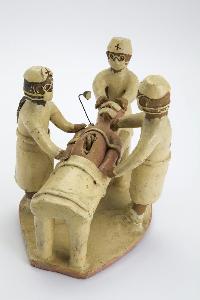Vitalino Pereira Dos Santos
Vitalino Pereira Dos Santos;Mestre Vitalino
Place: Caruaru
Born: 1909
Death: 1963
Biography:
Vitalino Pereira dos Santos, known as Mestre Vitalino, was a Brazilian folk artist, ceramist, and musician born in Caruaru, Brazil in 1909. He is considered one of the greatest artisans in the history of clay art in Brazil, with his work virtually unknown until 1947. Mestre Vitalino's sculptures are expressive narratives about life in the countryside and villages of northeastern Brazil.
Artistic Career
Mestre Vitalino's most famous works include 'o enterro na rede', 'cavalo marinho', and 'casal no boi'. His sculptures are a testament to his exceptional skill and attention to detail. The Museum of the Man of the Northeast in Recife, Brazil, houses some of his notable works, including 'Operation four physicians and a patient' and 'Self-portrait of Master Vitalino'.
Style and Technique
Mestre Vitalino's style is characterized by his use of clay to create expressive and narrative sculptures. His work is almost entirely made manually, with the lathe being used mostly for utilitarian pieces. The art of making vases, sculptures, and other objects became one of the strongest expressions of the culture in the Northeast region.
Legacy
Mestre Vitalino's legacy can be seen in his contributions to the world of folk art and ceramics. He is considered one of the greatest artisans in the history of clay art in Brazil, and his work continues to inspire artists today. For more information on Mestre Vitalino and his works, visit Vitalino Pereira Dos Santos on Wikioo.org.
- 'Operation four physicians and a patient' is a notable work by Mestre Vitalino, showcasing his skill in sculpting.
- The Museum of the Man of the Northeast houses many of Mestre Vitalino's works, including 'Self-portrait of Master Vitalino'.
- Mestre Vitalino's style is characterized by his use of clay to create expressive and narrative sculptures.
Mestre Vitalino passed away in Caruaru in 1963, but his legacy lives on through his art. Visit Vitalino Pereira Dos Santos on Wikioo.org to explore more of his works and learn about his contributions to the world of folk art and ceramics.








